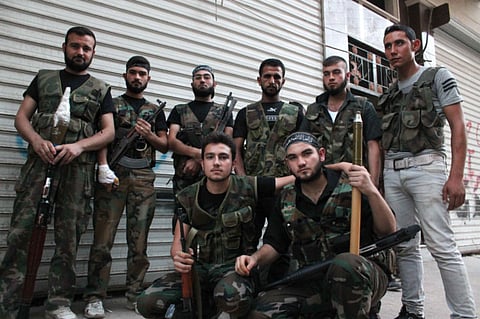Rebel band of brothers with a cause
Siblings ranging from ages 18 to 34 in Aleppo vow to end Al Assad regime or die trying

ALEPPO:They are a band of eight Syrian brothers, the youngest just 18 and the oldest 34, who have chosen to battle side by side for their nation against the powerful military of President Bashar Al Assad. Now they are in Aleppo, the northern commercial hub of Syria and its second city, the latest stop on their odyssey aimed at ridding their homeland of an oppressive regime. They are still together, and all still alive. But that could change, and they know and accept it. “If one or more of my brothers are killed, I will die with them. We carry the same blood and it would be an honour to die with them for the sake of freedom,” says Reda, the youngest, who just recently turned 18.
“It’s been more than a month since we arrived here, and ever since, we only put down our guns when we want to pray,” he said of Aleppo, the main focus since July 20 of the fight between the rebels and government troops.
Reda’s dream is to “study computer science” at university, he says, but it is an ambition he has had to consign to the back-burner.
“Today it’s more important to finish off Assad. My study plans can wait. For us young Syrians, our place is on the battlefield.”
His 20-year-old brother Rifaat, who has also abandoned his university studies, agrees.
“We young people are the future of Syria and that future lies on the streets,” he says, clutching an anti-tank rocket.
“We should be in the classroom, but because of the dictator we have had to take up arms. We’re fighting so the next generations can enjoy a peaceful and free future.”
Rifaat says he finds it frustrating that the West seems unable to draw a line between faith and terrorism.
“You think we’re all in Al QaIda because we chant ‘God is Great’! No - we believe in God, that’s all. He is now the only one helping us, and it is He who will lead us towards victory.”
The brothers greet Rifaat’s words with a resounding “Allahu akbar,” chanted in unison.
The eight left their home town of Sarmada in nearby Idlib province 17 months ago, nearly a month after the uprising that began with peaceful protests before degenerating into armed conflict when the regime launched a relentless crackdown.
The spark for the uprising came in March 2011, when several young boys were arrested and cruelly tortured for daubing walls in the southern city of Daraa with anti-government graffiti.
Thirty-four year old Anas, the eldest, remembers the first weeks of peaceful demonstrations that quickly became deadly.
“The army opened fire. Many of our friends were killed. Police would throw us in jail on the slightest pretext.”
Anas left behind a mobile phone shop that he owned as well as his children - “four adorable little girls” - to join the rebellion.
“Bashar thinks he’s the master and we are his slaves. But these slaves have had it with serving the master,” he says.
Ahmad, 24, is not as outspoken. Standing a little behind, he smiles timidly, occasionally elbowing one of his brothers and whispering something in his ear.
Young Reda speaks out for him and about him - with pride.
“Ahmad was taken during a demonstration and thrown into prison. They beat him up for days... When they told us to go and get him, we didn’t recognise him at first, he was so disfigured.”
In July 2012, the US-based Human Rights Watch spoke of “systematic patterns of ill-treatment and torture” by Syrian forces of opponents, identifying 27 detention facilities run by the regime across the country.
Since they joined the rebellion, the eight brothers have been from one hot spot to the next - “Homs, Idlib, Aleppo... We won’t stop until the regime collapses,” says a determined 26-year-old Issam.
The siblings say their father supported their decision to join the revolt.
“He wasn’t afraid we would die because he knows this is the only way to liberate Syria,” says Reda. “He prays for us, and for our victory. But if we do die he will be proud , for we will become martyrs.”
Duty interrupts. The brothers’ brigade is getting ready to attack a police station in the city, and they know that if the assault succeeds, the rebel army will be able to advance.



